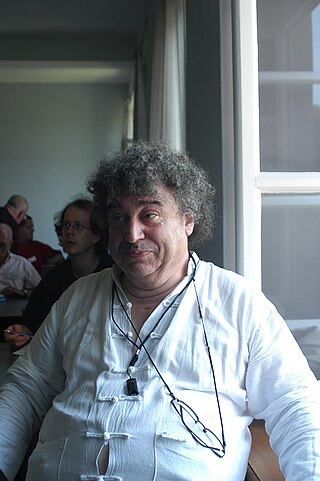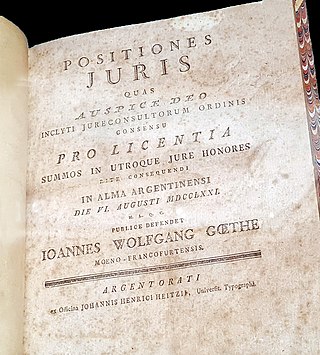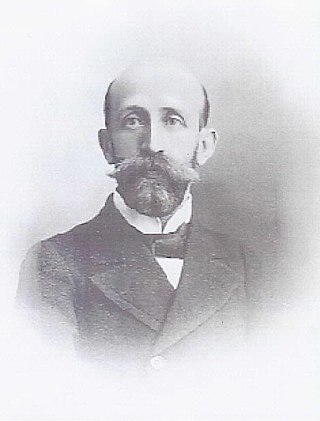Davide Sangiorgi | |
|---|---|
| Alma mater | University of Edinburgh (PhD) |
| Scientific career | |
| Fields | Computer science |
| Institutions | University of Bologna |
| Thesis | Expressing mobility in process algebras: first-order and higher-order paradigms (1993) |
| Doctoral advisor | Robin Milner |
| Website | www |
Davide Sangiorgi is an Italian professor of computer science at the University of Bologna. [1] He has previously held research positions at the University of Edinburgh and at Inria. He received his PhD from the University of Edinburgh under the supervision of Robin Milner in 1993. [2] He has had visiting positions at the Centrum Wiskunde & Informatica (CWI, Amsterdam), University of Cambridge, and University of Oxford.
His research interests are in the fields of concurrent systems, semantics and formal verification techniques. [3] [4] [5] [6]
He is a member, and past chairman, of IFIP Working Group 2.2 on the formal description of programming concepts, and a member of Academia Europaea. He is the head of the Research Team FOCUS, a joint laboratory between the University of Bologna and Inria.

Arthur John Robin Gorell Milner was a British computer scientist, and a Turing Award winner.
Andrew D. Gordon is a British computer scientist previously employed by Microsoft Research. His research interests include programming language design, formal methods, concurrency, cryptography, and access control.

A doctorate or doctoral degree is a postgraduate academic degree awarded by universities and some other educational institutions, derived from the ancient formalism licentia docendi.
In theoretical computer science a bisimulation is a binary relation between state transition systems, associating systems that behave in the same way in that one system simulates the other and vice versa.
In theoretical computer science, the π-calculus is a process calculus. The π-calculus allows channel names to be communicated along the channels themselves, and in this way it is able to describe concurrent computations whose network configuration may change during the computation.

The School of Informatics is an academic unit of the University of Edinburgh, in Scotland, responsible for research, teaching, outreach and commercialisation in informatics. It was created in 1998 from the former department of artificial intelligence, the Centre for Cognitive Science and the department of computer science, along with the Artificial Intelligence Applications Institute (AIAI) and the Human Communication Research Centre.

Philippe Flajolet was a French computer scientist.

A licentiate is an academic degree present in many countries, representing different educational levels. It may be similar to a master's degree when issued by pontifical universities and other universities in Europe, Latin America, and Syria.
Non-well-founded set theories are variants of axiomatic set theory that allow sets to be elements of themselves and otherwise violate the rule of well-foundedness. In non-well-founded set theories, the foundation axiom of ZFC is replaced by axioms implying its negation.

Jean-Marie Lehn is a French chemist. He received the Nobel Prize in Chemistry together with Donald Cram and Charles Pedersen in 1987 for his synthesis of cryptands. Lehn was an early innovator in the field of supramolecular chemistry, i.e., the chemistry of host–guest molecular assemblies created by intermolecular interactions, and continues to innovate in this field. He described the process by which molecules recognize each other. Drugs, for example, "know" which cell to destroy and which to let live. As of January 2006, his group has published 790 peer-reviewed articles in chemistry literature.
A magister degree is an academic degree used in various systems of higher education.
Mark Jerome Steedman, is a computational linguist and cognitive scientist.
In computer science, coinduction is a technique for defining and proving properties of systems of concurrent interacting objects.

Serge Joseph Abiteboul is a French computer scientist working in the areas of data management, database theory, and finite model theory.
Oscar Peter Buneman, is a British computer scientist who works in the areas of database systems and database theory.

Maurice Paul Nivat was a French computer scientist. His research in computer science spanned the areas of formal languages, programming language semantics, and discrete geometry. A 2006 citation for an honorary doctorate (Ph.D.) called Nivat one of the fathers of theoretical computer science. He was a professor at the University Paris Diderot until 2001.

Dmitry Semionovitch Mirimanoff became a doctor of mathematical sciences in 1900, in Geneva, and taught at the universities of Geneva and Lausanne. Mirimanoff made notable contributions to axiomatic set theory and to number theory. In 1917, he introduced, though not as explicitly as John von Neumann later, the cumulative hierarchy of sets and the notion of von Neumann ordinals; although he introduced a notion of regular he did not consider regularity as an axiom, but also explored what is now called non-well-founded set theory and had an emergent idea of what is now called bisimulation.
The International Conference on Concurrency Theory (CONCUR) is an academic conference in the field of computer science, with focus on the theory of concurrency and its applications. It is the flagship conference for concurrency theory according to the International Federation for Information Processing Working Group on Concurrency Theory. The conference is organised annually since 1988. Since 2015, papers presented at CONCUR are published in the LIPIcs–Leibniz International Proceedings in Informatics, a "series of high-quality conference proceedings across all fields in informatics established in cooperation with Schloss Dagstuhl –Leibniz Center for Informatics". Before, CONCUR papers were published in the series Lecture Notes in Computer Science.

Grigore Roșu is a computer science professor at the University of Illinois at Urbana-Champaign and a researcher in the Information Trust Institute. He is known for his contributions in runtime verification, the K framework, matching logic, and automated coinduction.

Kim Guldstrand Larsen R is a Danish scientist and professor of computer science at Aalborg University, Denmark. His field of research includes modeling, validation and verification, performance analysis, and synthesing of real-time, embedded, and cyber-physical systems utilizing and contributing to concurrency theory and model checking. Within this domain, he has been instrumental in the invention and continuous development of one of the most widely used verification tools, and has received several awards and honors for his work.